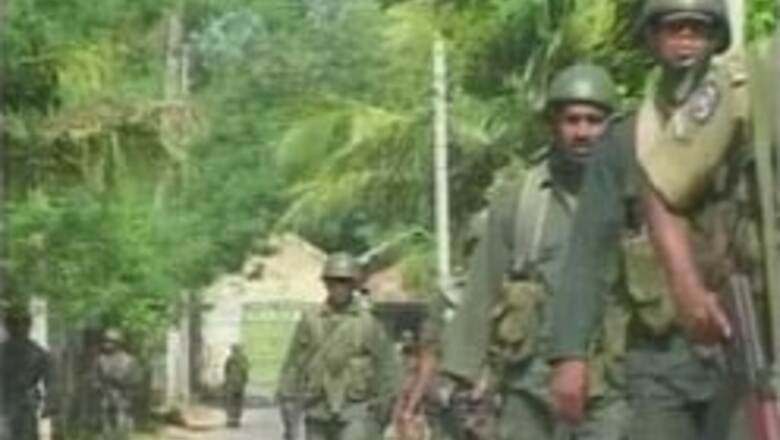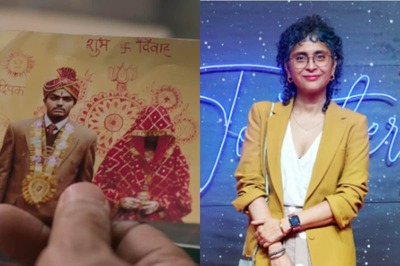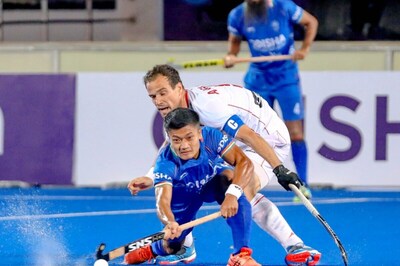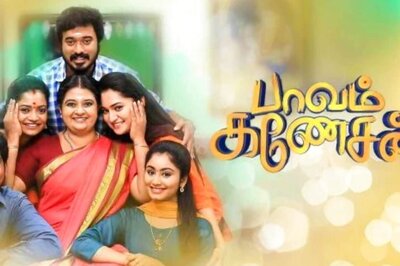
views
Colombo: Former Sri Lanka wicketkeeper Romesh Kaluwitharana said on Saturday that the prolonged civil war between the government and the LTTE was threatening to rob precious cricketing talent from the strife-torn region.
The 36-year-old swashbuckling opener, who played a key role in Sri Lanka's 1996 World Cup success, said there were a few seriously talented cricketers in the northern parts of the country which is controlled by the LTTE, who have been waging a battle with the Sri Lankan army for the past two decades and more, and they would be lost unless peace prevails.
"It has affected the country's economy, but it has not affected the sport yet. I hope it will not be in the future," Kaluwitharana said.
"Soon after the war stopped in 2002, I went there with a team to play a few matches. What I saw was some very good talent. Without proper grounds, proper facilities and proper coaching, they had very good players.
"I told the people there that if the peace continues and becomes permanent, we will definitely look after them. But with the war coming again, we couldn't do much.
"I think we are losing a lot of talent. Because this is one country, and we don't ill-treat anyone in the team because they are Tamils.
"Muralitharan was an example. He had lot of problems but we backed him."
The right-handed batsman formed an explosive partnership with Sanath Jayasuriya and the two led the team to a sensational triumph in the 1996 World Cup.
He recalled how his association with Jayasuriya, which changed the phase of One-Day cricket by exploiting the field restrictions in the first 15 overs, came into being.
"When we went to Australia in 1995, I did not do well initially when I came in at No 7. But I had done well as a top order batsman in the practice matches, and the captain (Arjuna Ranatunga), the manager (Duleep Mendis), and the coach
(Dav Whatmore) thought that I might do well if I bat in my normally aggressive style in the first 15 overs."
"They wanted to try this and gave me the opportunity. Fortunately, I had a good partner in Sanath who was already opening the innings. The first match I opened the innings I scored 77 and we won that match against Australia.
"In the second also I made a 70 against the West Indies. So, we succeeded from the start and we continued till the World Cup. We batted well and scored runs in quick time, and so we set a trend.
"When we failed, we had good back-up. Ashanka Gurusinha used to come in at No 3, and there was Aravinda (de Silva), Arjuna and (Roshan) Mahanama to follow.
"We clicked well, especially in the World Cup and continued to do well for two years after that."
PAGE_BREAK
Kaluwitharana said the players themselves were not surprised to win the World Cup.
"We had a good tour of Australia where we bounced back from a couple of bad games in the beginning. We came close to winning the final. We had the momentum," he said.
"We had a balanced side with good batsmen, bowlers and fielders. And the tournament was being played in the subcontinent, so the conditions also suited us.
"Nobody might have expected us to win, but we in the back of our mind always believed we can win. Our morale was high and we had the crowd support, but mainly because we were playing good cricket."
He, however, rued the fact that they were denied a fair victory in the semi-final against hosts India when crowd disturbance disrupted play and the match was awarded to the Lankans by default.
Kaluwitharana said that although the Indians got the two openers cheaply, the side believed they could defend the target.
"We always believed that 250 was not an easily gettable target because the wicket was cracking and batting would become difficult later in the day. Unfortunately it did not get that far."
The 1999 World Cup was a disaster for the Sri Lankans who failed to reach the semi-final.
"The conditions were different. It was in England and it was late summer. The wicket was doing a lot and the weather was cold. We couldn't adjust to the conditions and everybody struggled. The expectations were also high."
He was pleased that the other teams have followed on Sri Lanka's steps.
"In 1996, what we did was new. Now, it is the way. It became a strategy for everyone to follow because most succeeded by adopting that. It is not new anymore."
"We see total of 300 and above regularly now. In Twenty20 cricket, more runs are scored in 20 overs than it was done in a whole 50-over game."
The advent of Kumar Sangakkara brought an early end to his career in which he played 49 Tests and scored 1933 runs besides making 3711 runs in 189 One-Dayers. But he is happy that he had a worthy successor.
"I always believed that if a youngster is going to come and take my place he has to be really good both as a batsman and wicketkeeper, and do good for the team. I did not want to give my place to anyone who was not better than me," he said.
"But when I saw him I knew he was really good. Initially, there was some uncertainty with me and him being played in place of each other. So, there was pressure. Then soon I realised that I had to step down and give him the
opportunity."
PAGE_BREAK
Kaluwitharana said it was inevitable that modern teams were insisting on wicketkeepers who can bat a bit rather than picking specialist keepers.
"In today's game, you are always looking for all-rounders. That is how the wicketkeeper is looked at now," he said.
"If you have a wicketkeeper who can only keep, then you are going to be short of either a batsman or a bowler.
"Why, even the bowlers are expected to score runs." Talking on Sri Lankan cricket, could he say why the emerald isle has produced relatively more fast bowlers than India, despite the latter having better infrastructure?
"Maybe it is that they (bowlers in his country) are looked after individually and they have more enthusiasm. I don't know the reason but it is a good thing, isn't it?"
"Being a small country we produced a world beating team. I think it is just that we have the talent."
The topic invariably moves to Muralitharan.
Kaluwitharana said the introduction of 15-degree allowance to bend the bowling elbow was a "correct thing".
"The ICC had to come up with some theory because they have found that most bowlers have a bent arm and some are born with it. They had to give some leeway for that. I think they have done the correct thing."
He fiercely defended the offie who was no balled for throwing in Australia a decade ago and has since then gone on to take more than 650 wickets to be world's second highest wicket-taker.
"He (Muralitharan) has coped with a lot of pressure. He is a unique player, when he stops playing there won't be another Murali. He works hard on his game and always wants to try out new things."
Kalu, who has taken to coaching now, said India and Sri Lanka were the two teams he expected to challenge Australia for the World Cup in the Caribbean next year.
"I think it is going to be Australia, India and Sri Lanka. We because we have played well there, the wickets there are slow and suits us."



















Comments
0 comment